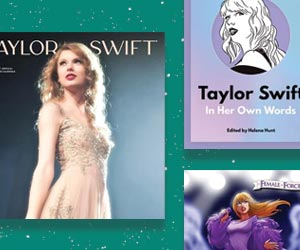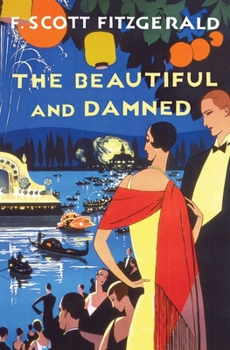The Beautiful and Damned
Select Format
Select Condition 
Book Overview
Part of the Macmillan Collector's Library; a series of stunning, pocket-sized classics bound in real cloth with gold foiled edges and ribbon markers. These beautiful books make perfect gifts or a... This description may be from another edition of this product.
Format:Paperback
Language:English
ISBN:1476733422
ISBN13:9781476733425
Release Date:March 2013
Publisher:Scribner Book Company
Length:480 Pages
Weight:0.75 lbs.
Dimensions:1.2" x 5.2" x 8.0"
Customer Reviews
7 ratings
Lots of ups and downs
Published by Kaiti , 7 months ago
Wow this was a book of ups and Downs. The ending was pretty horrible. It just kind of ended. Not to sure about what I feel yet.
Really good book!
Published by Kelley , 2 years ago
Novels from this era are some of my favorites. Highly recommend!
Unexpected
Published by Leah Garcia , 5 years ago
Although written brilliantly, the whole idea of two people that never fulfill their dreams and ultimately unhappy with themselves and their marriage is DEPRESSING. I don't like Anthony or Gloria, they are both horrible people that expect everything to be handed to them on a silver platter. And even though they get what they desperately need in the end, they're still unhappy.
A must-read--before it's made into a movie
Published by Thriftbooks.com User , 15 years ago
Nearly ninety years after its first publication, _The Beautiful and Damned_ is still a shockingly relevant account of the entitlement class, the children of the rich or privileged who don't know how to navigate through life without big money. And, it's a New York City novel--written as only a mid-westerner can. It seems to me that because New Yorkers are too much in the middle of it to see themselves clearly, an intelligent "outsider" like F. Scott Fitzgerald must come along. To write as well as he did, Fitzgerald let the city inhabit him. New York got into his blood, and he recorded it in narrative right down to the dirt under the carpet. Fitzgerald's details lead the reader into the depths of the beautiful and doomed couple, the Gloria-Anthony entanglement, as they are part and parcel of the extremes of poverty and wealth (in the World War I era or the roaring 20s). I don't know how Fitzgerald knew what he knew about the human psyche, or specifically about how a young man might react when he is good-looking and swimming in money and New York, but Fitz's life at Princeton University among this set of people gave him the environment in which to observe; Fitzgerald supplied the story around which the narrative coheres. Of course, there are autobiographical elements to this novel--a lot of himself and Zelda--but what the literary art requires is critical distance. To put his main characters through some shameful scenes, Fitzgerald had to know what tough love is in the New York City context. He had to put his couple to the test, people who from birth had relied on the "religion" of charm and money. And the author had more than just critical distance: F. Scott had them down right! Every expression, every word. Gloria: "This is life! Who cares for the morrow." And you can see Anthony deciding to have one more drink, his speech becoming slurred, his manners maudlin. While Anthony and Gloria wait for his inheritance, we find out what they're made of. Most pleasurable about Fitzgerald's craft is his carefully-controlled technique of letting Anthony and Gloria visit hell (the "damned" in the title) while softening the harsh surgery-like light with well-timed, well-handled, lyrical sentences. In a single beautiful line, the passage of the winter sun describes both Fitzgerald's craft and his beautiful couple's descent: Gloria "lay still for a moment in the great bed watching the February sun suffer one last attenuated refinement in its passage through the leaded panes into the room" (p.173). Fitzgerald knew how to show the attenuated and refined way downhill. One more thing about the craft of writing: Only the omniscient narrator technique--which Fitzgerald employs--can show characters in shameful acts and show what they're thinking, and the circumstances in which they got there, and how they "need" money in order to "survive." I wonder if now, in nearly 2010, this novel is not more important than in 1922. More than ever, _The Beautif
VERY TOUCHING, VERY WELL DONE
Published by Thriftbooks.com User , 20 years ago
"It is seven thirty on an August evening. The windows in the living room of the gray house are wide open patiently exchanging the tainted inner atmosphere of liquor and smoke for the fresh drowsiness of the late hot dusk. There are dying flower scents upon the air, so thin, so fragile, as to hint already of a summer laid away in time." This is the story of a young couple Anthony and Gloria Patch living out their days to the hilt in New York City as they await the death of Anthony's grandfather, Adam Patch from whom they expect to inherit his massive fortune. Gloria is a spoilt child from Kansas City turned into a sophisticated and most beautiful woman. Gloria does not intend to lift a finger to do any domestic work in the home, no matter how slight; while Anthony who considers himself an aesthete, finds it quite hard to get his act together and instead of buckling down to some work, prefers instead to hang with his wife and their friends on nightly binges. They drink and eat in the classiest restaurants and hotels, rent the most expensive apartments, travel out to the West in the spring time driving plush cars, wearing top-of-the-line clothing and just generally living it up high on the hog, as they wait. Meet Maury Noble who is Anthony best friend who spends his time between New York and Philadelphia; Richard Caramel who has just completed writing a book and looking for new ideas for a second one. Joseph Bloeckman from Munich who started out small in America and is now a big shot in Show Biz. Also the quiet Jewess Rachael Barnes and Muriel Kane who is young, flirtatious and sometimes a bit too talkative and Tana the Japanese housekeeper of the Patches. We are shown the Patches at their very best as the novel starts, with the world at their feet and loaded with cash with which they make very expensive choices. But, as we get further in, we see things begin to change gradually and we realize that those very choices will be their very downfall. It was quite a good read but it could be very heartbreaking at times as we put ourselves into the shoes of the main characters. All lovers of F. Scott Fitzgerald should read this book if you haven't done so already, and those of you who like reading about the ultra rich in the Roaring Twenties this one is for you. It is the kind of book that you feel you will want to read again. It is that good and I shall miss it. Reviewed by Heather Marshall Negahdar (SUGAR-CANE 10/04/04)
Moral depravity personified
Published by Thriftbooks.com User , 21 years ago
The genius of F.Scott Fitzgerald shines brilliantly in this vastly underappreciated classic novel of moral depravity. The pervasive themes of Fitzgerald include moral corruption, profligate behavior, agnosticism, selfishness, narcissism, egocentrism, and of course, a sick obsession with money and alcohol. These themes permeate all too well throughout the beautifully written The Beautiful and Damned(pardon the pun). Released in 1922, 2 years subsequent to the seminal This Side of Paradise and 3 years prior to the magnum opus The Great Gatsby, incomprehensibly, The Beautiful and Damned was not well received critically nor financially. As a result, history has erroneously filed it under the dubious sophomore jinx category. Strange it may seem, I vehemently disagree. As you read this book, you witness first-hand the maturation of an amazing writer. No American writer of the 20th Century can compare to the profound power and unwavering genius that is F.Scott Fitzgerald. If you enjoyed The Great Gatsby, you will no doubt enjoy this work - an equally beautifully writen and tragic tale of aspiring morally depraved young Americans in pursuit of The American Dream. "Remarkable that a person can comprehend so little and yet live in such a complex civilization."
His Best Roaring 20's Novel
Published by Thriftbooks.com User , 26 years ago
By no means his best novel (as others here suggest) but highly underrated. Often one hears of Great Gatsby as his best, Tender is the Night as his labored over lost classic, This Side of Paradise as his promising and famous debut, and The Love of the Last Tycoon as the classic that never was, but Beautiful and Damned is never mentioned. In my opinion this is the book that best describes the hedonistic society I have read of called the Roaring Twenties. As the reader watches all the characters lose their dreams and fall into a depraved, hollow existent based on alcohol I am reminded too fondly of my college years.If you are a Fitzgerald fan read this one after This Side of Paradise. If you are someone with a passing interest in the Twenties read this. If you are someone with just a passing interest in Fitzgerald then read this one last, after any of the other Fitzgerald novels.
The Beautiful and Damned Mentions in Our Blog

30+ Great Gifts for Swifties
Published by Ashly Moore Sheldon • December 10, 2023
Choosing the perfect gifts for the diverse mix of people we know can be tricky. That's the idea behind our mini gift guides with tailored recommendations for the unique set of characters in your life. Here are our gift suggestions for all your favorite Swifties.

The Literary Wisdom of Ted Lasso
Published by Ashly Moore Sheldon • October 28, 2021
There are many reasons to love the Apple+ show, Ted Lasso. And one of the most compelling of these (for us anyway) is all the books that show up in it! Ted and his loyal sidekick Coach Beard are clearly big readers and the literary figures prominently in their chatter. So while we wait for season three, we are exploring the Ted Lasso library.






